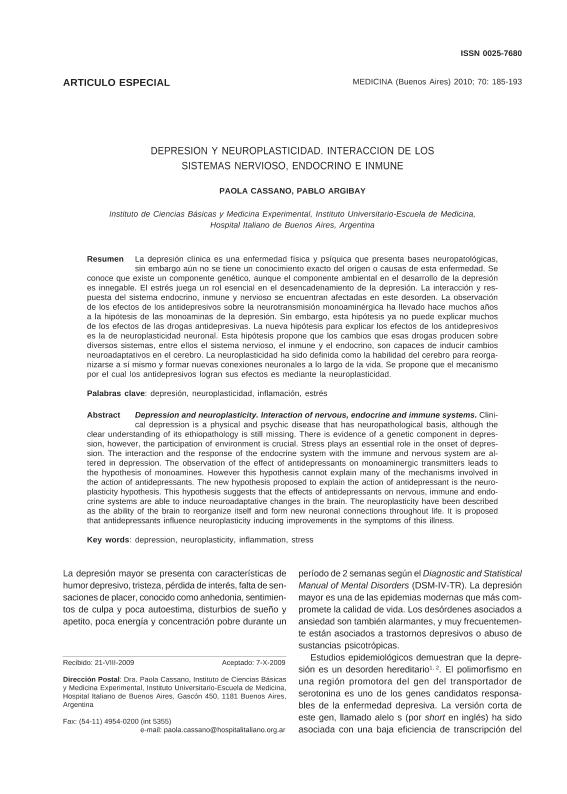Artículo
La depresión clínica es una enfermedad física y psíquica que presenta bases neuropatológicas, sin embargo aún no se tiene un conocimiento exacto del origen o causas de esta enfermedad. Se conoce que existe un componente genético, aunque el componente ambiental en el desarrollo de la depresión es innegable. El estrés juega un rol esencial en el desencadenamiento de la depresión. La interacción y respuesta del sistema endocrino, inmune y nervioso se encuentran afectadas en este desorden. La observación de los efectos de los antidepresivos sobre la neurotransmisión monoaminérgica ha llevado hace muchos años a la hipótesis de las monoaminas de la depresión. Sin embargo, esta hipótesis ya no puede explicar muchos de los efectos de las drogas antidepresivas. La nueva hipótesis para explicar los efectos de los antidepresivos es la de neuroplasticidad neuronal. Esta hipótesis propone que los cambios que esas drogas producen sobre diversos sistemas, entre ellos el sistema nervioso, el inmune y el endocrino, son capaces de inducir cambios neuroadaptativos en el cerebro. La neuroplasticidad ha sido definida como la habilidad del cerebro para reorganizarse a sí mismo y formar nuevas conexiones neuronales a lo largo de la vida. Se propone que el mecanismo por el cual los antidepresivos logran sus efectos es mediante la neuroplasticidad. Clinical depression is a physical and psychic disease that has neuropathological basis, although the clear understanding of its ethiopathology is still missing. There is evidence of a genetic component in depression, however, the participation of environment is crucial. Stress plays an essential role in the onset of depression. The interaction and the response of the endocrine system with the immune and nervous system are altered in depression. The observation of the effect of antidepressants on monoaminergic transmitters leads to the hypothesis of monoamines. However this hypothesis cannot explain many of the mechanisms involved in the action of antidepressants. The new hypothesis proposed to explain the action of antidepressant is the neuroplasticity hypothesis. This hypothesis suggests that the effects of antidepressants on nervous, immune and endocrine systems are able to induce neuroadaptative changes in the brain. The neuroplasticity have been described as the ability of the brain to reorganize itself and form new neuronal connections throughout life. It is proposed that antidepressants influence neuroplasticity inducing improvements in the symptoms of this illness.
Depresion y neuroplasticidad: interaccion de los sistemas nervioso, endocrino e inmune.
Título:
Depression and neuroplasticity: Interaction of nervous, endocrine and immune systems
Fecha de publicación:
02/2010
Editorial:
Medicina (Buenos Aires)
Revista:
Medicina (Buenos Aires)
ISSN:
0025-7680
e-ISSN:
1669-9106
Idioma:
Español
Tipo de recurso:
Artículo publicado
Clasificación temática:
Resumen
Palabras clave:
Depression
,
Neuroplasticity
,
Nervous System
,
Endocrine System
Archivos asociados
Licencia
Identificadores
Colecciones
Articulos(SEDE CENTRAL)
Articulos de SEDE CENTRAL
Articulos de SEDE CENTRAL
Citación
Cassano, Paola Mariana; Argibay, Pablo; Depresion y neuroplasticidad: interaccion de los sistemas nervioso, endocrino e inmune.; Medicina (Buenos Aires); Medicina (Buenos Aires); 70; 2; 2-2010; 185-193
Compartir




